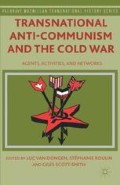Abstract
In the United Kingdom, the think-tank community devoted to foreign and security policy issues has for decades been dominated by Chatham House, the International Institute for Strategic Studies (IISS) and the Royal United Services Institute (RUSI). However, beginning in the 1970s, this trio nearly became a foursome due to the emergence of the Institute for the Study of Conflict (ISC), headed by the highly controversial Cold War activist Brian Crozier. Officially, the ISC was created to conduct unbiased research into the “social, economic, political and military causes and manifestations of unrest and conflict throughout the world”.1 Unofficially, the Institute’s research and activities were very much shaped by its politically active director. Crozier admitted in his autobiography that “Throughout my period as Director, the ISC was involved in exposing the fallacies of détente and warning the West of the dangers inherent in a policy of illusion.”2 Given Crozier’s anti-Soviet and anti-détente views, as well as his reputation as a frontman for the CIA, the ISC as a whole became a target of the Left. For instance, in their book The “Terrorism” Industry, Edward Herman and Gerry O’Sullivan note that the ISC “provides an especially well-documented case study of the use of a purportedly ‘independent’ institute as a front for propaganda operations of a hidden intelligence agency and corporate sponsors”.3
Access this chapter
Tax calculation will be finalised at checkout
Purchases are for personal use only
Preview
Unable to display preview. Download preview PDF.
Notes
Memorandum of Association cited in Brian Crozier, ‘The Study of Conflict’, Conflict Studies 7 (October 1970), p. 2.
Brian Crozier, Free Agent: The Unseen War 1941–1991 (London: Harper Collins, 1993), p. 96.
Edward Herman and Gerry O’Sullivan, The Terrorism Industry: The Experts and Institutions That Shape Our View of Terror (New York: Pantheon, 1990), p. 108.
See for instance: Diana Stone, Capturing the Political Imagination: Think Tanks and the Policy Process (London: Frank Cass, 1996);
Andrew Denham and Mark Garnett, “The Nature and Impact of Think Tanks in Contemporary Britain”, in Michael David Kandiah and Anthony Seldon (eds), Ideas and Think Tanks in Contemporary Britain, Volume 1 (London, Frank Cass, 1996), pp. 43–61.
Richard Sim, “Research Note: Institute for the Study of Conflict”, Terrorism: An International Journal 1 (1978), p. 214.
G.R. Urban, Diplomacy and Disillusion at the Court of Margaret Thatcher: An Insider’s View (London: I.B. Tauris, 1996), p. 2
Brian Crozier (ed.), Annual of Power and Conflict 1971: A Survey of Political Violence and International Influence (London: Eastern Press, 1972).
Cited in Giles Scott-Smith, “Interdoc and West European Psychological Warfare: The American Connection”, Intelligence and National Security 26 (2001), p. 376.
For additional information on Crozier’s links with Interdoc, see Giles Scott-Smith, Western Anti-Communism and the Interdoc Network: Cold War Internationale (Basingstoke, Hampshire: Palgrave Macmillan, 2012).
Editor information
Editors and Affiliations
Copyright information
© 2014 Jeffrey H. Michaels
About this chapter
Cite this chapter
Michaels, J.H. (2014). The Heyday of Britain’s Cold War Think Tank: Brian Crozier and the Institute for the Study of Conflict, 1970–79. In: van Dongen, L., Roulin, S., Scott-Smith, G. (eds) Transnational Anti-Communism and the Cold War. The Palgrave Macmillan Transnational History Series. Palgrave Macmillan, London. https://doi.org/10.1057/9781137388803_10
Download citation
DOI: https://doi.org/10.1057/9781137388803_10
Publisher Name: Palgrave Macmillan, London
Print ISBN: 978-1-349-48214-6
Online ISBN: 978-1-137-38880-3
eBook Packages: Palgrave History CollectionHistory (R0)

